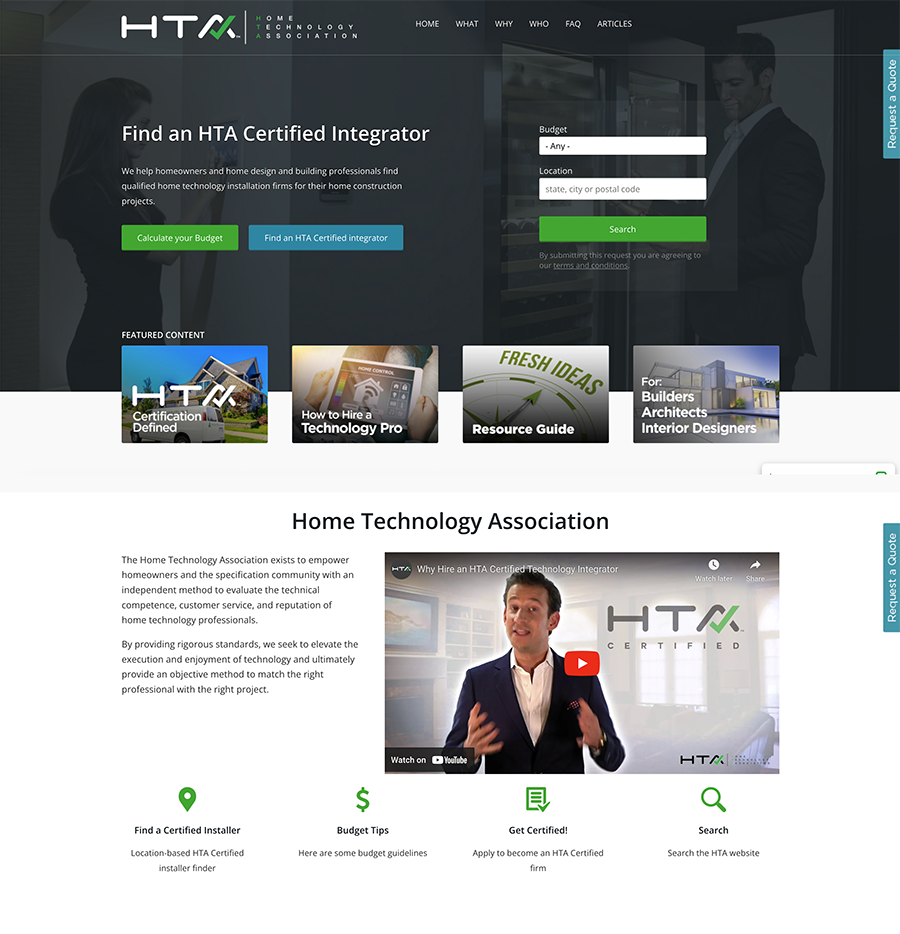
Integrators, Trust, and the Trades, Pt. 1
related articles
“Once a client learns there’s a standard for whatever it is they’re purchasing, they tend to seek out that standard if they care about quality”
On how HTA Certification encourages architects, designers, and builders to make qualified integrators part of the design team from a project’s inception
by Josh Christian
March 27, 2023
One of the biggest goals for the Home Technology Association (HTA) since its founding in 2017 has been to bridge the gap between integrators and architects, interior designers, and builders. The first way we did this was to build the HTA certification standard so integrators who meet it have a legitimate way to differentiate and elevate themselves from ones who shouldn’t even be allowed to bid on bigger projects because they don’t have the experience or are just all about the quick buck.
HTA certification has already served as a great way for an integrator to quickly establish a trust relationship with trade partners like designers, architects, and builders. When I began my career as an integrator in the late 1990s, the trade partners tended to bring integrators into a project at the very last minute, so it took me a long time to create enough trust for them to refer me on a project. I would sometimes have to be at it for two, three, even four years. Now, with HTA certification, an integrator can point to the certification standard on our website and it builds credibility.
I didn’t realize back then that the trade partners’ mistrust was often well-founded. In my naivety, I thought a decent number of integrators were good—maybe 50 percent good and 50 percent not so good. And I was shocked later in my career to discover that it’s more like 10 percent are top-performers and 90 percent so-so or worse. It took a while for architects, designers, and builders to hire my firm because they were lumping me in with all the bad integrators by default. Their assumption of integrators often was “guilty until proven innocent.” I worked hard to earn their trust. So when my company would win awards or was published in a magazine, I’d show off our work and build trust that way.
The HTA certification standard helps the best integrators build that trust and credibility much quicker. Since only about 10 percent of integration firms will meet the HTA standard, our members can leverage the fact that they’ve been certified to tell their trade partners, “Hey, you don’t have to trust me that we’re a good firm—we’re HTA Certified.” The integrator will then share the HTA Certification standard with them, and this has proven to build trust and credibility. We help our dealers with a powerful elevator pitch that works. Some of them have even been able to convince their architect, builder, and designer partners to require HTA Certified integrators on their projects.
All integrators have experienced this situation: The client seems to be OK with their price, and everything is going really well. But at the 11th hour, the client goes out and gets another proposal that’s significantly cheaper because they went to someone who’s not qualified for the project. Of course the low-ball proposal is a different scope, it’s inferior product—all the usual suspects. The integrator is left defending their legitimate proposal against one that shouldn’t even be considered, which creates a terrible situation because the builder/architect/designer doesn’t know what to say to the client except, “I know this industry’s got some problems, but please trust me and use my guy.” But they typically defend their integrator of choice up to a point and then relent to the client. If the integrator leads with the fact that they’re HTA Certified, shares the elevator pitch, and points the client to the HTA standard, though, clients tend to shop around much less, especially when the integrator uses the HTA technology budget estimator to share realistic installed costs first. The chance of losing a deal to a low-baller goes down drastically. And if they do lose that client, it’s one they don’t want anyway. It’s better to spend time with clients who appreciate quality workmanship and customer service, not ones who are pennywise and pound foolish. Those clients always turn out to be nightmares.
HTA certification gives the architect, designer, and builder ammunition to hold firm and say, “Hey, I only work with HTA Certified integrators.” They can send the client to the HTA website to learn what certification means—which then makes the client wonder, “If this other company is so good, why aren’t they certified?” Educating trade partners about the HTA certification standard really works. The smart integrators understand this and use it to their advantage.
Think about how standards affect us in our everyday lives. We expect to have a great dining experience if we select a Michelin star-rated restaurant. We expect our vehicle to be safe if it receives a five-star safety rating. And we expect a mechanic to be competent if they’re ASE certified. We pay more for GIA or EGL-rated diamonds as their value has been determined by a defined standard and rated by professionals. That is what HTA certification is doing for the CI industry.
Some integrators believe the Home Technology Association and the HTA certification standard need to be household names for them to have any value, which is absolutely not true. Once a client learns there’s a standard for whatever it is they’re purchasing, they tend to seek out that standard if they care about quality. Don’t believe me? For those of you who don’t know what the GIA or EGL diamond rating standard is (in my estimation, about 40% of men don’t know), stop by a jeweler and tell them you’re looking for a quality diamond for your wife or girlfriend. Very early in the jeweler’s qualifying questions, you’ll be told about GIA or EGL, or both. Once you hear the pitch, I’m about 99% sure you’ll be sold on it and will most likely choose the rated diamond, even though it costs more. Clients will do the same for HTA Certified dealers. Let that sink in for a moment . . .
In Part Two, Josh discusses the HTA Design Partner and Technology Partner programs, which are meant to make integrators more credible for clients and help strengthen the relationships between integrators and their trade partners.
A technology enthusiast since he was a child, Josh Christian entered the home technology industry in 1995, soon joining a firm that he helped grow into one of the largest custom integration companies in the industry. In 2017, co-founded the Home Technology Association and became its CEO, bringing his years of experience as an integrator, marketer, and consultant to fulfilling the Association’s goals of identifying the top home technology installation firms and bringing them the recognition they deserve.
© 2025 Cineluxe LLC






